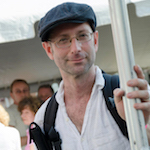Julio Rivera was murdered on July 2, 1990 in the P.S. 69 schoolyard by three young men who went out that night armed with a claw hammer, a plumber’s wrench and a kitchen knife, hunting for “a gay guy to stretch out.” The next day, the press didn’t report on the homicide, the police were looking to write the murder off as a drug deal gone bad, and the community wasn’t going to do anything about it: business as usual in Jackson Heights where during the 70s and 80s over a dozen murders of gay men had never been solved.
Julio of Jackson Heights is the story of how all this changed. It is the story of how a handful of people – Julio’s friends and family – decided that they would not accept the official police report, and learned how to organize, ultimately bringing their case to the attention of then Mayor Dinkins. And it is the story of how their actions sparked a movement that founded the Queens Pride Parade, supported the creation of over a dozen LGBT organizations and ultimately served as the platform that elected two closedly gay candidates to the New York City Council.
Twenty years later, the Rivera family, Julio’s friends, community leaders and the police speak of the decisions they made and reflect upon the changes they set in motion.
“In 2007, when my father died in the same hospital in which Julio died (though under very different circumstances) I realized that I had never profoundly experienced the loss of death. And up to that point, I had believed that asking people like Alan Sack, Julio’s friend and ex-lover, and Teddy Rivera, his brother, to talk about losing someone they loved on camera was somehow cruel and intrusive. The loss of my father made me see things differently: as the documentarian of the Parade, I now felt obligated to at least offer them the opportunity to keep the memory of Julio and their work alive through a film.
“I decided I would reach out to Alan and the Rivera family and got their phone numbers from a mutual friend. Less than five minutes after Danny gave me the numbers I went to Lety’s – that same bakery-café where I first learned of the Pride Parade – to sit down and make the phone calls, and when I walked in there was Alan Sack sitting with a friend, having a coffee. I introduced myself and this is where the film begins.” Richard Shpuntoff.


 Born and raised in Jackson Heights, Queens, Richard Shpuntoff has directed a dozen short films that have screened at over 30 festivals and venues internationally including Epiphany of Returning, Morning Dance, In Queens my ambitious soul I bare and El Grand 97. Prior to his work in film, he was a documentary photographer whose works include the black and white photography book God, Gold and Glory, and a 20 year documentary project of the Queens Pride Parade (1993 – 2012). Julio of Jackson Heights is his first feature length film.
Born and raised in Jackson Heights, Queens, Richard Shpuntoff has directed a dozen short films that have screened at over 30 festivals and venues internationally including Epiphany of Returning, Morning Dance, In Queens my ambitious soul I bare and El Grand 97. Prior to his work in film, he was a documentary photographer whose works include the black and white photography book God, Gold and Glory, and a 20 year documentary project of the Queens Pride Parade (1993 – 2012). Julio of Jackson Heights is his first feature length film.



